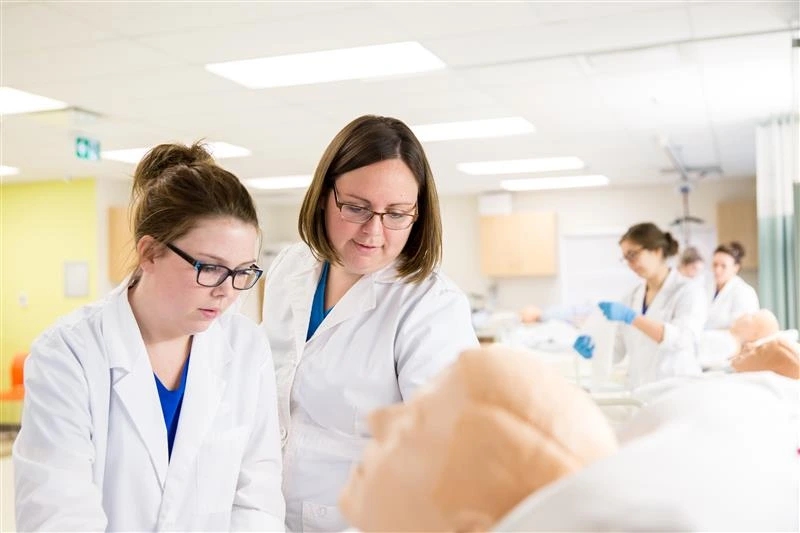Licensed Practical Nurse
Up to 50% Free Tuition
Hands-on Experience
180+ Hours in a
Hospital Setting
Financial Aid Support
Scholarships, Grants,
and Bursaries Available
Small Class Sizes
With Small Class Sizes,
Capped at 36 Students
Flexible Start Date
Choose your intake
January, May or September
Program Overview
Working NB is currently paying up to 50% of tuition for the Practical Nurse Program at Oulton College.
Are you passionate about healthcare and eager to make a positive impact in the lives of others? Oulton College is a leading nursing school offering a Practical Nurse Program that could be the perfect opportunity for you!
As the first private college program in New Brunswick with full accreditation from the Association of New Brunswick Licensed Practical Nurses (ANBLPN), our two-year program is designed to prepare you for a rewarding career in nursing. You’ll benefit from a blend of classroom instruction and hands-on training in our state-of-the-art Nursing lab, along with approximately 15 weeks of clinical and practicum experience in real healthcare settings. This comprehensive training ensures you develop the essential skills needed to deliver quality care and enhance your professional resume.
If you’re committed to making a difference in the well-being of others, don’t miss this chance to join a vital and rewarding field. If you are a student of Biochemistry, Chemistry, or a related field, this program is an excellent fit for you.
Accreditation & Eligibility
Oulton College’s Practical Nurse program is fully accredited by the Association of New Brunswick Licensed Practical Nurses (ANBLPN). This accreditation ensures that our curriculum meets provincial standards and prepares students for professional practice. Upon graduation, students are eligible to write the Canadian Practical Nurse Registration Examination (CPNRE) and, if successful, apply for licensure as a Licensed Practical Nurse (LPN) in New Brunswick and other participating provinces.

Launch Your Nursing Career with Oulton’s Practical Nurse Program
- Fast-Track to Employment – Graduate in just 2 years and become a Licensed Practical Nurse (LPN)
- Financial Support – Scholarships & funding options available
- Hands-On Training – Build confidence through clinical placements and simulated lab experiences
- Expert Instruction – Learn from experienced nurses and healthcare professionals
- Supportive Learning – Small class sizes and one-on-one guidance throughout your journey
- Accredited & Recognized – Fully approved by ANBLPN and aligned with provincial standards

Hands-On Learning That Prepares You for Real-World Nursing
At Oulton College, Practical Nurse students learn by doing. From day one, you’ll gain the skills, confidence, and experience needed to thrive in today’s healthcare settings through immersive, hands-on education.
- Simulation-Based Training – Practice critical care, medication administration, and patient communication in a safe, realistic setting
- Clinical Placements – Apply your skills in real healthcare environments with guidance from experienced professionals
- Real-World Scenarios – Respond to mock emergencies, assess patients, and build practical skills through structured labs
- Modern Equipment – Train using the same tools and technology found in today’s hospitals and clinics
- Collaborative Learning – Work closely with classmates in team-based simulations and skill-building exercises
Financial Options Available
There are many funding opportunities available for students pursuing a career in healthcare. Our Financial Aid Team is here to help! Whether you’re looking for scholarships, bursaries, student loans, grants, or flexible payment plans, we’ll guide you through the process to maximize your financial support.
Canada Student Grant for Full-Time Students
$525 per month of study
New Brunswick Student Loan
Up to $200 per week of study
Canadian Student Loan
Up to $300 per week of Study
Oulton College Memorial Scholarship
Up to $1,000
New Brunswick Bursary
Up to $160 per week of study
Renewed Tuition Bursary
$1,500 for college students
Canada Student Grant for
Students with Disabilities
$2,800 per academic year if applicable
Canada Student Grant for Services and Equipment – Students with Disabilities
Up to $20,000 per academic year
Canada Student Grant for
Full-Time Students with Dependants
$280 per month of study per child
Our financial aid advisors are ready to help you.
Career Opportunities
Nursing continues to be one of the most in-demand and rewarding careers in Canada. As a graduate of Oulton College’s Practical Nurse program, you’ll be prepared to write the Canadian Practical Nurse Registration Examination (CPNRE) and become a Licensed Practical Nurse (LPN).
LPNs play a vital role in healthcare teams, with opportunities to work in hospitals, long-term care facilities, medical clinics, and community health organizations. The profession offers strong job security, competitive salaries, and the chance to make a meaningful impact every day.
For current job openings and salary expectations, visit NBJobs.ca.
Registered Nurse (RN)
Average Salary $78,000
Licensed Practical Nurse (LPN)
Average Salary $51,160
Nursing Supervisor
Average Salary $81,000

Admissions Requirements
- Grade 12 Diploma, Adult Diploma or GED.
- Grade 11 or 12 Biology* with a minimum average of 65%.
- Grade 11 or 12 Math* with a minimum average of 65%.
- Grade 11 or 12 English* with a minimum average of 65%.
- Meeting with an Admissions Advisor.
- Successful completion of the health science application process.
*Courses marked with an asterisk (*) must be completed at the academic level.
International students whose first language is not English must submit proof of English language proficiency, unless they have completed a minimum of three years of study at a school where English is the language of instruction. Please see the international application process here.
Frequently Asked Questions
What is the Licensed Practical Nurse (LPN) program at Oulton College?
Oulton College’s LPN program in Moncton, NB, is a comprehensive, hands-on diploma designed to prepare students for a rewarding career in practical nursing. The program blends classroom learning with clinical experience, aligning with the standards set by the Association of New Brunswick Licensed Practical Nurses (ANBLPN).
What makes Oulton College stand out as a nursing school?
Oulton College stands out as a nursing school by offering New Brunswick’s first private Practical Nurse Program fully accredited by ANBLPN. With a strong focus on hands-on training, modern lab facilities, and 15 weeks of clinical experience, we prepare students for real-world nursing careers in just two years.
How long is the Oulton College LPN program?
The Practical Nursing program is delivered full-time over two academic years (five semesters), including a final preceptorship. This structure allows students to graduate and enter the workforce efficiently.
What are the career opportunities for Licensed Practical Nurses in New Brunswick?
Graduates of Oulton College’s LPN program are in high demand across New Brunswick. Career paths include hospitals (such as Horizon and Vitalité Health Networks), long-term care homes, special care facilities, and community health settings. Bilingual graduates may find even more opportunities in the region.
Is the LPN program at Oulton College accredited?
Yes. The program is fully approved by the Association of New Brunswick Licensed Practical Nurses (ANBLPN), ensuring it meets provincial standards for practical nursing education and licensure.
What kind of clinical experience will I get in this program?
Students gain extensive hands-on experience through supervised clinical placements in a variety of healthcare environments. These include hospitals, long-term care facilities, and community-based settings throughout Moncton and surrounding areas.
What are the admission requirements for the LPN program?
Applicants typically need a high school diploma (or equivalent) with a minimum of 65% in academic-level English, Math, and Biology. Additional steps include an interview with an Admissions Advisor and successful completion of the health science application process.
Can international students apply to the LPN program?
Yes. International applicants are welcome and must demonstrate English language proficiency unless they’ve studied in an English-instruction school for at least three years.
What happens after I graduate from the LPN program?
Oulton College Nursing Program fully prepares you to write the Canadian Practical Nurse Registration Examination (CPNRE). Upon passing, you can apply for licensure with the ANBLPN and begin practicing as Licensed Practical Nurses in New Brunswick or other provinces.
Please Note: Content is subject to change by administration as required to meet program and profession standards.
Why Choose Oulton College
Best Canadian Nursing School
Proudly Canadian since 1956
We've built a strong network, ensuring graduates are career-ready in healthcare.
Financial Support
We offer scholarships, bursaries, and flexible payment options.
+ 90% Success Rate
Over 90% placement rates for all program.
Career Services
Our team connects you with employers and helps with resumes and job-market skills.
Campus Facilities
Train in state-of-the-art nursing labs with the latest medical technology.
Industry Partnerships
We partner with healthcare providers to offer placements and job opportunities.
Student Services
24/7 free counseling services, academic support, and one-on-one guidance.
In-person Classes
Nursing is hands-on. choose in-person learning and stand out to employers.
Get the Full Program Details
Want to learn more about our Practical Nurse (PN) program? Download our detailed program guide to explore course curriculum & program structure.

